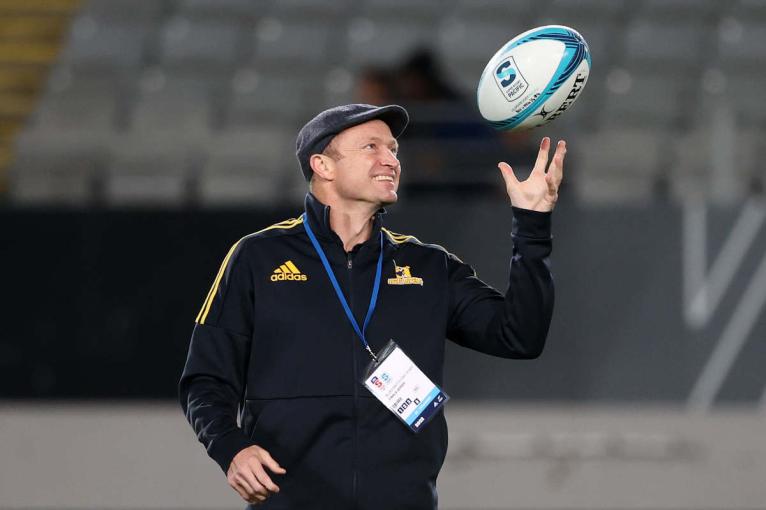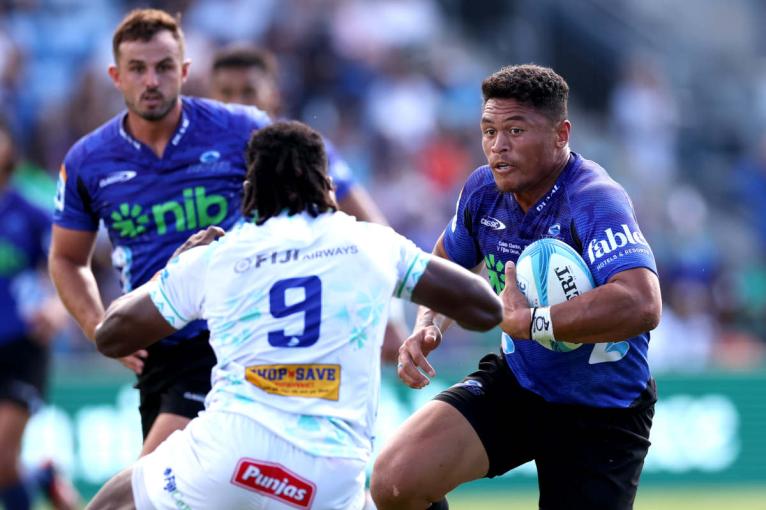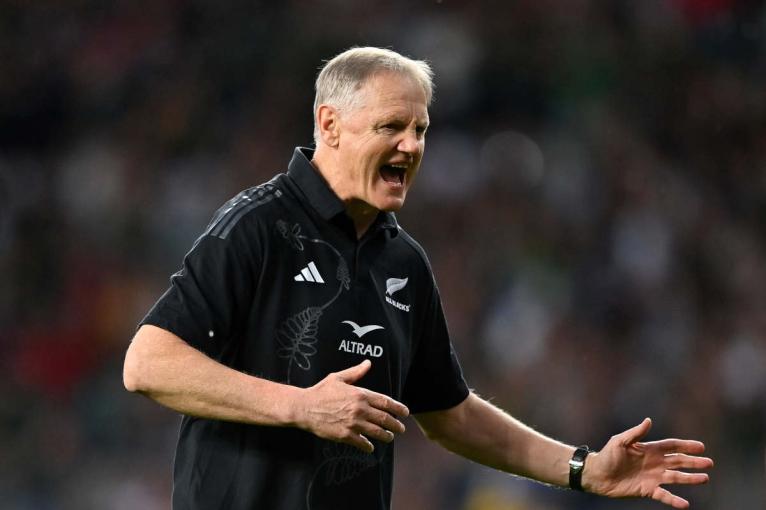While most of the established rugby world would consider their embattled finances and ailing balance sheets to be their most significant threat, in New Zealand, it is the continual loss of coaching intellectual property that is starting to feel like the iceberg which may rip a hole in the hull.
It’s not just that New Zealand is losing swathes of intellectual property every year – it is the fact so much of it is easily and readily being taken directly to competitors.
Trade secrets are flying out the door and there is reason to believe that good coaches with heavy recent involvement at the highest levels of the game in New Zealand are going to play an integral role in hurting the All Blacks this year.
In what can only be described as a random quirk of fate, former All Black Tony Brown has found himself in the most unexpected of positions.

Two weeks ago he was unveiled as part of the new Springboks coaching team for 2024. Recognised as one of the game’s smartest tactical minds, with a proven track record of building innovative, high-tempo, high-skill attack patterns, Brown, who has spent the last eight years with Japan, was snapped up by the Boks.
They want to utilise his ability to enable teams to create and exploit space – which is the same reason why in 2019, both Ian Foster and Scott Robertson wanted him in their respective coaching teams when they were applying for the All Blacks job.
In the end, Japan doubled Brown’s money to stay and so when he made himself open to offers after last year’s World Cup, South Africa pounced and could hardly believe their luck that they were able to get him.
Former Springboks captain Jean de Villiers, who had played with Brown when the former All Black had a late-career stint at the Stormers in 2008, said: “Tony started in the mid-90s playing Super Rugby and international rugby, went all the way through and finished at about 2010.
“Then he went straight into coaching…coached in Japan, coached the Highlanders, coached throughout the world. So now he’s got 35 years of IP and experience at the highest level of rugby that he can fall back on and now bring that to the Boks.”
As much as there is major reward for the Blues, there is significant risk to the All Blacks that they are letting a wolf too near the sheep and come August and September this year… it may be that the real beneficiary of Brown’s stint in Auckland is the Springboks.
If seeing Brown snaffled by the arch enemy was a little hard for New Zealanders to take, the position has become yet more curious as Brown has been parachuted into the Blues Super Rugby team as an emergency replacement for assistant coach Jason O’Halloran, who is on indefinite medical leave.
It’s a stunning acquisition for the Blues in the most unfortunate of circumstances and having Brown on board could see the club finally unleash the full potential of a backline that contains outrageous talents such as Stephen Perofeta, Rieko Ioane, Caleb Clarke and Mark Tele’a.
To see this young quartet blossom will be the plus side of Brown being with the Blues, but so too will there be a cost to him spending time in Auckland.
He’s going to see for himself, first-hand, how these four operate. He’s going to build in-depth understanding of their strengths and weaknesses and get to know what defaults come into their game when they are under pressure, what they might not be good at anticipating and what sort of attacking ploys they least enjoy facing.

As much as there is major reward for the Blues, there is significant risk to the All Blacks that they are letting a wolf too near the sheep and come August and September this year when the Rugby Championship is in Johannesburg and Cape Town, it may be that the real beneficiary of Brown’s stint in Auckland is the Springboks.
The last six years or so have seen the All Blacks and Springboks play five tests that were decided by just one point, while there have also been two draws.
The margins between them are tiny and the intelligence that Brown will pick up during Super Rugby could be enough to manufacture the half opportunity that ends up with the Springboks winning.
Equally, the All Blacks are facing a new threat now that Joe Schmidt has taken over as head coach of the Wallabies. Schmidt joined the All Blacks last year as an assistant coach, only leaving the team after the World Cup and he too has intimate knowledge of the players in black his side will likely face this year.
It’s undeniably dangerous for New Zealand to have Brown and Schmidt locked in by the Springboks and Wallabies and it perhaps raises the question of whether the time has come for New Zealand Rugby to consider ways in which it can better protect its intellectual property.
And that’s the danger for the All Blacks: it’s not such a fear for them that Schmidt and Brown will be lifting specific plays and ideas and transposing Kiwi ideas into their new teams – it’s that they both know so much about individual New Zealand players.
There’s undeniable value to the Wallabies in him knowing deep, inaccessible secrets about key All Blacks and anyone who doubts that should think about what value New Zealand took from Schmidt’s knowledge of the Irish players at last year’s World Cup when the two sides met in the quarter-final.
It’s undeniably dangerous for New Zealand to have Brown and Schmidt locked in by the Springboks and Wallabies and it perhaps raises the question of whether the time has come for New Zealand Rugby to consider ways in which it can better protect its intellectual property.
Schmidt’s appointment has been characterised by NZR as an opportunity to strengthen its key strategic partner.

The Wallabies are a mess, and they need to be competitive and credible for the Bledisloe Cup and Rugby Championship to have greater meaning and enable NZR to better fulfil its commercial ambitions for both.
Having Schmidt with the Wallabies is a means to stabilise a weak team and strengthen Southern Hemisphere rugby by enabling Australia to find some cohesion and confidence.
Similarly, NZR allowed Robbie Deans to remain with the Crusaders in 2008 when he was also the Wallabies coach; and in 2012 and 2013 Graham Henry was able to be technical director for both the Blues and Argentina.
These dual roles were sanctioned – as was Brown’s involvement with the Highlanders in various guises between 2016 and 2022 when he was also Japan’s assistant – on the basis New Zealand has to do its bit to grow the game and help others become more competitive for the greater good.
In 2013, former NZR chief executive Steve Tew talked about this challenge of helping others but not so much that it becomes detrimental to the All Blacks.
“It is a balancing act because we do want to help some nations develop and grow,” he said.
“But equally we live in an open, global rugby economy and our intellectual property, particularly among the coaches and players, is spread out all over the world. There is nothing we can do about that other than once a coach or player signs a contract to leave New Zealand, to restrict their access to what we have.
The time is coming when New Zealand will have to ask whether it wants to help the rest of the world or save itself.
“The reality is IP is going to be pretty stale pretty quickly anyway but there are some sensitivities that we have to manage as best we can. But frankly, we are best trying to control what we can, which is growing our own physical and technical abilities and staying ahead of everyone else.”
And maybe that last statement is the issue that will force New Zealand to rethink whether it has the balance right.
The All Blacks have not been the world’s number one team since early 2019 – not for any length of time the way they were between 2009 and 2018.
Their win ratio in the last four years is 70 per cent, compared with the 90 per cent it sat at between 2012 and 2019. They have racked up historic first losses on home soil to Argentina and Ireland and haven’t won the World Cup since 2015.
Not only have Ireland surpassed them as the world’s most consistent team, but the Springboks have potentially also become the team with the greater World Cup legacy and renowned ability to innovate on the big occasions.
The time is coming when New Zealand will have to ask whether it wants to help the rest of the world or save itself.


Cmon, there’s no such thing as a trade secret in a game watched by millions and analysed within an inch of its life.
NZ coaches can improve teams they coach but it won’t be by telling them secret ways that NZ plays
I feel the writer is experiencing paranoia. Coaching is a profession and an amazing experience. These guys are merely plying their trade. The abs will continually evolve and be a competitive force. I say keep the competition getting better.
The game is growing and expanding. The rest of the world has caught up. Schimdt, Gatland, Rennie, and Henry all masters of the game. It would be selfish to restrict their experience and pass it down. This only serves to better the game. What we should be careful of not to stifle the game and throttle it. Let innovation be born out of this necessity.
The only way for the NZRU to stop this is to have a restraint of trade clause in their contracts. That would arguably drive more coaches overseas. Unless the NZRU starts paying Super Rugby coaches internation level wages.
There have been players/coaches/non playing staffers moving around the world to play rugby (and the rest of the worlds sports) for over 30 years now.
Imagine Michael Hooper, Keiran Read & Willie le Roux all playing for Toyota in Japan not being able to talk freely with each other, let alone the other evil spies they were playing with.
Hooper spoke glowingly of his time rubbing shoulders with Read as a team mate, low and behold we still haven’t won back the Bled
I know for some kiwis it might be hard to fathom but there are actually people from other nationalities’ out there who can, and have, offered the game of Rugby some IP over the years.
I’m sorry but the general sentiment of this article sounds like a whinge.
Hear hear!
Your dead right !!!!
We need a strong Australia to test us and it'll annoy the kiwi-hating part of their fan base so good luck to Joe.
South Africa played some entertaining rugby with Libbok in the past couple of years, before relying on their traditional game when it really mattered. As their 2019 team gets phased out it'll be interesting to see how much Brown changes their style for 2027.
I agree the quicker Ozzie get back to form as we have known them in ghe past the better. Can’t have NH sides coming down under running rough shod.
Part of a professional global game I guess. As long as we have a strong grass roots rugby culture that keeps producing quality players and coaches we can replace those who leave and keep innovating the game, we’ll be fine.
Yes, the key word being innovating, so new coachs coming through are needed to keep bringing the innovation.
That horse has long bolted.
Its a professional game, get over it.
Well the Rugby community is now global. cant stop coaches from going away and exploring new opportunities.
What exactly is the solution to this? There is only 1 All Blacks team and 5 Super Rugby teams. So at any one time there is demand for exactly 6 top coaches in NZ rugby, and most of the best coaches from NZ would be taking a significant step backwards to go back to coaching Super Rugby.
It’s ridiculous to suggest that elite coaches like Brown and Schmidt owe their intellectual property to NZ. They have both become significantly better coaches from IP gained in the NH. Same with Henry and Hansen. Even the great Wayne Smith coached in Italy and the UK before delivering his best results as ABs assistant coach and his legendary Black Ferns turnaround. Vern Cotter took what he learned in France and Scotland and turned Fiji into a genuine force in XVs and now he’s back at The Blues sharing all that knowledge - who should be protecting their IP here? Fiji? Scotland? France?
Foster, Moar, and Plumtree had virtually no NH coaching experience between them and they were undoubtedly the worst coaching team the ABs have had for decades.
NZ have benefitted more from NH rugby IP than vice versa.
Whatever the tone of this author any union should be asking that same question still “what is the solution”.
Using it in cycles to bring IP back as you describe is certainly going to be one method. For NZR money is a simple solution regarding club v club, concerning national coaches IP is not really going to worry anyone, opportunity is what’s going to matter to coaches wanting to work in the international scene and I would be interested in setup approaches like Razor’s might retain persons capable of gaining higher level roles elsewhere (eg Schmidt), having more responsibility. I also want NZ’s other teams to get a much greater profile, playing other T2 nations is very important still of course but also going up against similar teams from Ireland and France is likely to give experience towards those nations playing strategies that will go on to help in later, higher, roles.
It’s more like a dozen top coachs of Brown’s ilk that they should be trying to keep on the go. That’s your top side, the next guys in line to take over (say a offshore club coach who has the Maori ABs for 6 games a year), and then another coaching of four as a back up (for when you have the balls to say ‘no’ to your previous plans to raise Foster up). Nothing to do with others having your best talent, as you say, all about there availability, which these two aren’t examples as both can come back after a couple of years if they needed to be part of a plan (say warming up towards taking over in 2028).
It works both ways. As the article noted Joe Schmidts in depth knowledge of Ireland certainly gave NZ a tactical edge in the RWC QF.
NZ can play it thus: Go abroad and coach as often you like. In RWC year, everyone back in the farm, lock the gate, spill the beans.
So Razor wanted Tony Brown to join his staff in 2019 but didn’t want him to join his staff now. What changed in the space of 4 years?
The unavailability of his preferred staff in 2019?
Browns unavailability in 2022 due to NZR hiring pattern?
Quite possibly a drop in Japans standards? might be more you angle?
It could be that he thought that Brown would continue with Jamie Joseph post 2023 and he had already committed to Holland and McDonald. I'd rather that we had Brown in our coaching box though.
Brown turned him down in 2019
I hate to break it to you, but NZ Rugby is actually behind when it comes to intellectual rugby knowledge. In fact they maybe rank 4th or 5th in the world when it comes to forward thinking coaching styles. This is just another example of how NZ's amateurish approach to the game is going to bite them in the ass over the next 5 years or more.
Your havn a laugh maybe . What do you call Farrells coaching styles where he witnessed his side create 37 breakdowns with no result. Be interesting to know what instructions he may hav been screaming into his walkie talkie in the dying stages of that game. The looks on the faces of the team, their entourage, and fans was enough to realize they’d just been bitten on the arse.
What is another example? What else were you thinking amateurish? Like their old school defensive style?
NZ showed you can still be smart in implementing old strats. All Blacks are not really in a position to implement drastic new ones like Ireland are able to for example, so I’m figuring your perception is out of whack. Have to say your rankings are about right though, with England being so far out in front by their sheer numbers and spectrum of styles from the way they have got Ireland playing to how England overachieved by being the best 6N side at the WC.
If based solely on the International level, a few of these T2 sides will rank up there as wel
Bit late for that, other nations, particularly in the NH, have been snapping up kiwi coaches and players they can somehow shoe-horn into their national teams for years now.
Think the trade secrets have well and truly bolted,plus it thins out nz’s depth as a result, which is a nice little bonus for the NH.